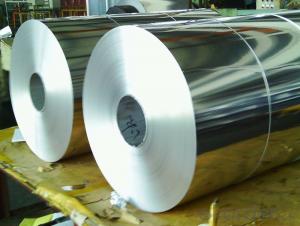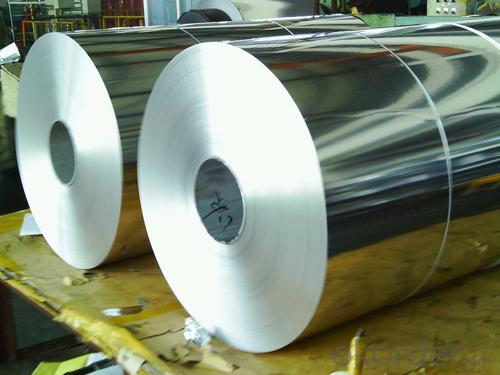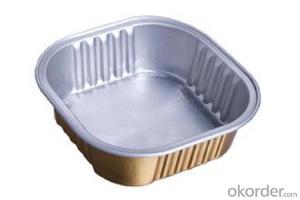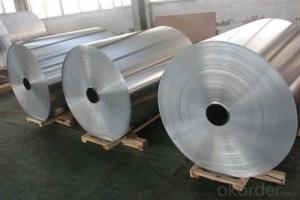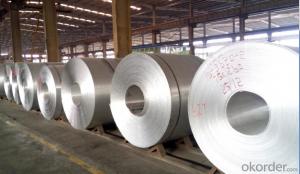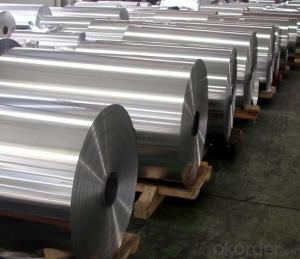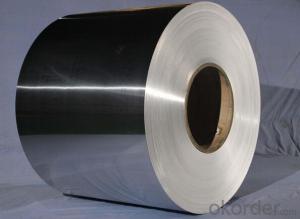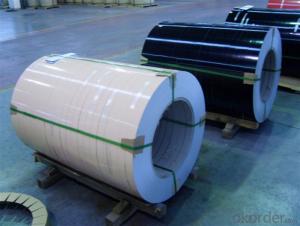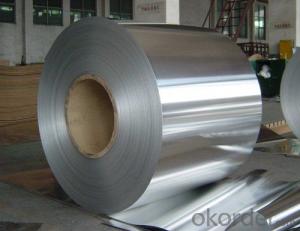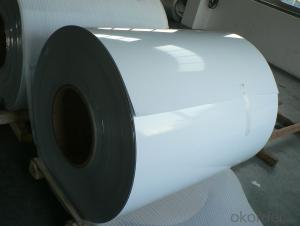Roll Aluminum Coil Michigan 5754 Alloy H22 Aluminum Rolled Sheet Aluminium Coil
- Loading Port:
- Shanghai
- Payment Terms:
- TT OR LC
- Min Order Qty:
- 5 m.t.
- Supply Capability:
- 500 m.t./month
OKorder Service Pledge
OKorder Financial Service
You Might Also Like
Specification
5754 Alloy H22 Aluminum Rolled Sheet Aluminium Coil
aluminum coil specifications:
1) Alloy :1050, 1060,1100, 3003 3004 3105 3A21 5005 5052 etc
2) Temper: O/H12/H14/H1/H18/H32/H34/H36/H38//H111/H112/H116/H321/T6/T651/T3/T351 etc
3) Thickness: 0.1mm to 6mm
4) Width:20mm to 3300mm
5)Coil weight: 100kgs to 6 tons depends on actual requirement
6)Core material: Aluminum or paper
7)Coil Inner diameter: 75mm, 150mm, 200mm, 300mm, 405mm, 505mm or as required
8) Protective film can be added
item | 3003 Aluminum coil | |
Standard | GB/T3190-2008,GB/T3880-2006,ASTM B209,JIS H4000-2006,etc | |
Material | 1060,1050,1100 3003,3103,3004,3005,3105 5052, 5454,5754 | |
Size | Thickness | 0.5mm-3.5mm |
Width | 800-1500mm | |
Weight/Roll | About 1.5MT/3MT | |
Quality control | Mill Test Certificate is supplied with shipment, Third Part Inspection is acceptable. | |
Surface | Bright, polished, hair line, brush, checkered, embossed, etc | |
Trade terms | Price term | ,FOB, CNF, CIF, etc |
Payment Term | TT,L/C | |
MOQ | 2MT | |
20 GP Capacity | About 20-25MT | |
Delivery time | 1.The products will delivery immediately after receiving the payment. 2.According to the order quantity, prompt delivery. | |
Export to | Ireland,Singapore,Indonesia,Ukraine,Spain,Canada,USA,Brazil,Thailand,Korea,Iran,India,Egypt,Kuwait, Oman,Viet Nam, South Africa, Dubai, Russia, etc | |
Package | Stick blue film→plastic film→waterproof paper→1~2 tons on a export standard pallet(corner protection) | |
Application | 1)Further making utensil.2)Solar reflective film3)The appearance of the building4)Interior decorating:ceilings,walls,etc.5)Furniture cabinets6)Elevator decoraction7)Signs,nameplate,bags making.8)Decoration inside and outside the car9)Household appliances:refrigerators,microwave ovens,audio equipment,etc.10)The consumer electronics:mobile phones,digital cameras,MP3,etc. | |
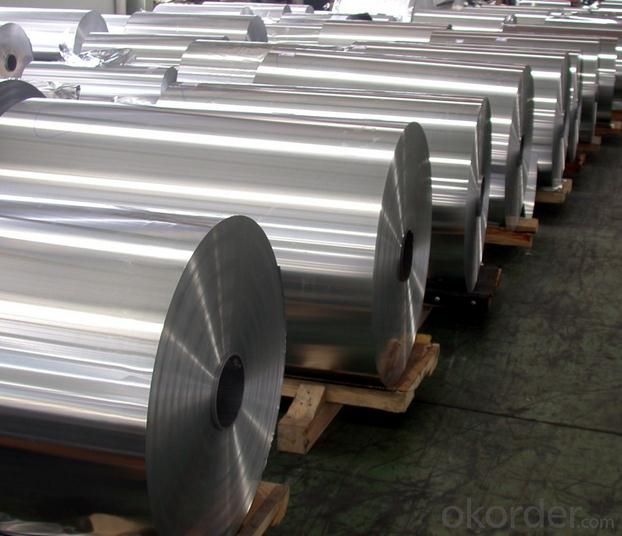
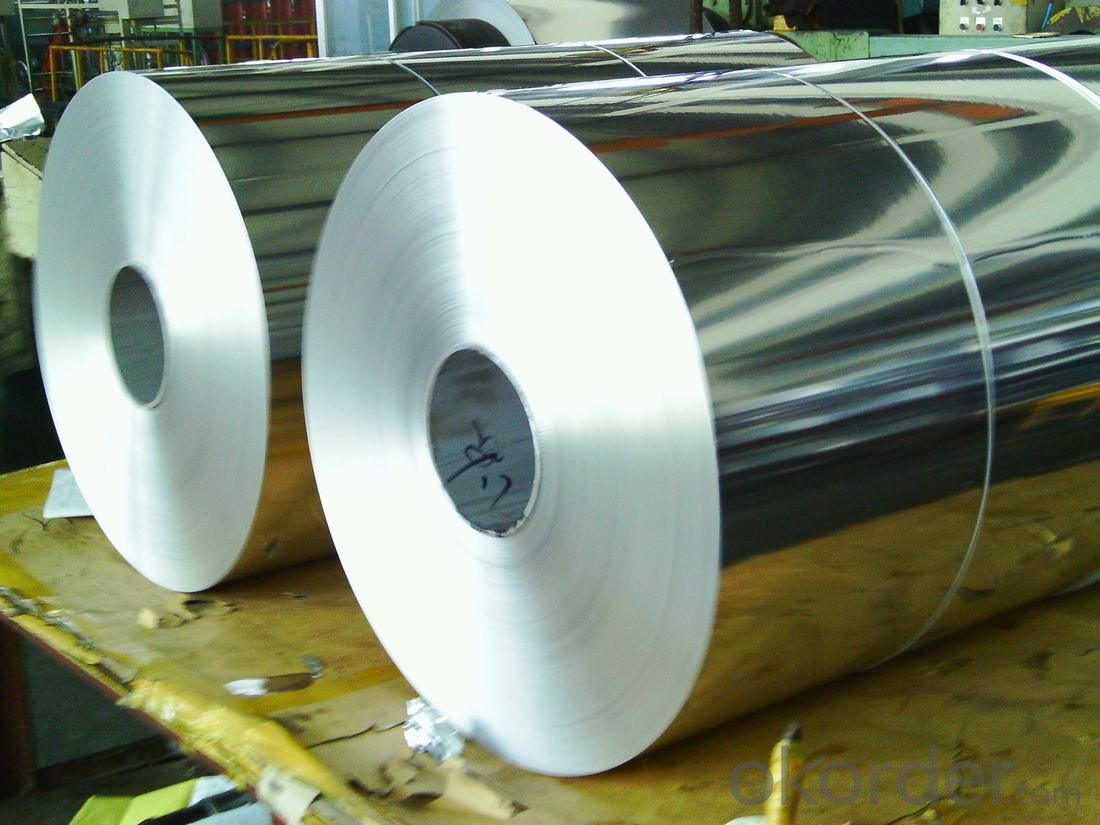
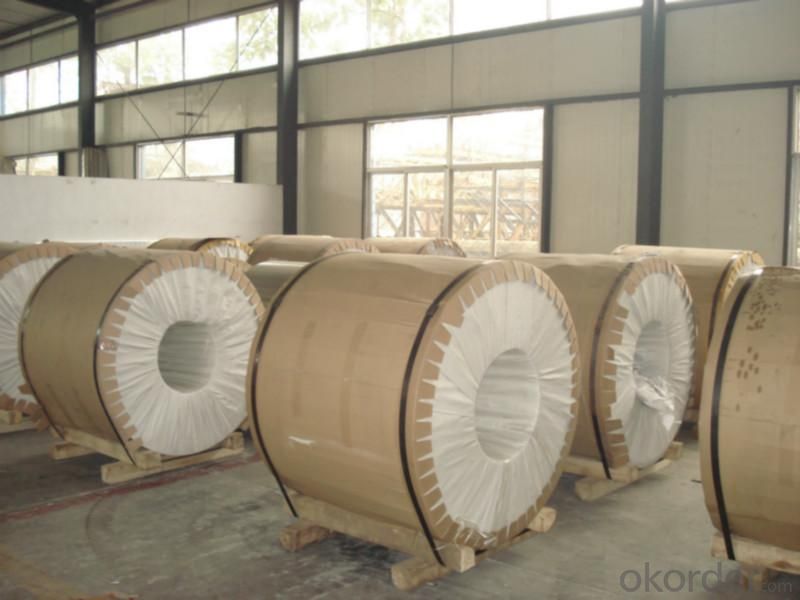
- Q: This question asks for methods to prevent rust formation on aluminum coils during indoor storage.
- <p>To prevent rust on aluminum coils when storing them indoors, ensure that the storage area is clean and dry. Keep the coils away from moisture and humidity, as these can cause oxidation. Use protective wrapping or coverings to shield the coils from dust and airborne moisture. Regularly inspect the coils for any signs of condensation or dampness and address these promptly. Maintain proper ventilation in the storage area to reduce humidity levels. Additionally, avoid stacking the coils directly on the ground; use pallets or racks to elevate them, which helps in air circulation and prevents contact with moisture that could be present on the floor.</p>
- Q: What are the unique considerations or safety measures to be aware of when using aluminum wire in welding?
- <p>When using aluminum wire in a welding process, special precautions include ensuring proper ventilation to avoid inhaling aluminum fumes, which can be harmful. Use the correct polarity and amperage settings on your welding machine, as aluminum requires direct current electrode negative (DCEN) for most processes. Clean the aluminum surface thoroughly to remove any oxides or contaminants that can affect the weld quality. Protect the aluminum from atmospheric contamination with a shielding gas, typically argon or a mixture, during the welding process. Be cautious of the high thermal conductivity of aluminum, which can lead to faster heat dissipation and may require adjustments in welding technique or parameters.</p>
- Q: Can aluminum coils be used for packaging applications?
- Yes, aluminum coils can be used for packaging applications. Aluminum is a lightweight and durable material that is commonly used in various packaging applications due to its excellent barrier properties, resistance to corrosion, and ability to be easily formed into different shapes. It is commonly used for packaging food and beverages, pharmaceutical products, and many other consumer goods.
- Q: What are the safety considerations when handling aluminum coils?
- When handling aluminum coils, there are several safety considerations that need to be taken into account. Firstly, it is important to understand that aluminum coils can be quite heavy, especially when dealing with larger sizes. Therefore, proper lifting techniques should be used to avoid strain or injury to the back and muscles. This may involve using lifting aids or getting assistance from others when moving or positioning the coils. Secondly, aluminum coils can have sharp edges or corners, which can cause cuts or puncture wounds if not handled carefully. It is advisable to wear appropriate personal protective equipment, such as gloves, when handling the coils to protect against any potential injuries. Additionally, aluminum is a highly conductive material for electricity and heat. Therefore, it is crucial to ensure that the coils are not in contact with any live electrical sources or exposed to open flames or intense heat. This can help prevent electrical shocks or fires, which could pose significant safety risks. Furthermore, proper storage and stacking of aluminum coils is essential to prevent accidents. Coils should be stored in a stable and secure manner, ensuring that they are not at risk of falling or rolling over. Proper stacking techniques, such as using appropriate supports or pallets, should be employed to prevent them from toppling over. Lastly, it is important to be aware of any specific safety guidelines or regulations provided by the manufacturer or relevant authorities when handling aluminum coils. Following these guidelines can help ensure the safe handling and use of the coils and minimize the risk of accidents or injuries. In conclusion, the safety considerations when handling aluminum coils include using proper lifting techniques, wearing personal protective equipment, avoiding contact with electrical sources and heat, ensuring proper storage and stacking, and following manufacturer guidelines. By taking these precautions, the risk of accidents or injuries can be significantly reduced.
- Q: How are aluminum coils used in the production of beverage cans?
- Aluminum coils play a crucial role in the production of beverage cans. These coils are essentially flat, thin sheets of aluminum that are wound into a coil shape. Firstly, the aluminum coils are unwound and fed into a machine that coats them with a thin layer of a protective material, usually a polymer. This coating helps prevent the aluminum from reacting with the beverage and affecting its taste or quality. Next, the coated aluminum coils are passed through a series of rollers that gradually shape them into a cylindrical form. This process is known as cupping, where the flat coil is transformed into a cup-like shape. This cup will eventually become the body of the beverage can. Once the cups are formed, they are trimmed to the correct height and diameter. The excess aluminum is recycled to minimize waste. The cups are then cleaned and rinsed to remove any contaminants. After cleaning, the cups are passed through another machine that applies a liquid compound to their inner surface. This compound acts as a barrier between the aluminum and the beverage, preventing any potential reactions or contamination. Following this, the cups are shaped into the final can body by being pressed between a top and bottom mold. The molds are designed to give the cans their characteristic shape and ridges. Any excess aluminum is trimmed off, and the cans are once again cleaned to ensure their purity. Finally, the cans are sent for filling with the desired beverage, sealing, and labeling processes before being packaged and shipped for distribution. In summary, aluminum coils are used in the production of beverage cans by providing the raw material from which the cans are made. Through a series of processes including coating, cupping, shaping, and cleaning, the aluminum coils are transformed into the final can bodies. These cans are then filled, sealed, and labeled before they are ready for consumption.
- Q: The general roll also 5,6t appearance, specific to your own weigh, length, weight = / (width * thickness * density)
- The density of aluminum is 2.7 and the molding weight is usually less than 3.5 tons, depending on the forming width and thickness. The wider, the thicker, the shorter.
- Q: I have been reading up on thermite and the required ingredients. I have extremely fine aluminum powder from a small etch-a-sketch sitting on plastic wrap in my room. On the comments page of the site i got the thermite ingredients from, multiple people said that thermite could explose if you use too fine of a powder. I have also read that powdered aluminum can become very explosive when it is exposed to air or if it becomes damp. Ive gotten particulary worried because the humidity right now is 93%. So, is powdered aluminum too dangerous to have in house and is too fine powdered aluminum explosive when in thermite?
- Fine sugar in the form of dust is also explosive as well as fine flour I think.
- Q: What are the potential applications of mill-finished aluminum coils?
- Due to their versatile properties and finishes, mill-finished aluminum coils can be applied in a wide range of industries. Here are some potential uses for mill-finished aluminum coils: 1. In the building and construction industry, mill-finished aluminum coils have numerous applications. They can be employed for roofing, siding, wall cladding, gutters, and downspouts, among other purposes. The mill finish not only enhances the building's aesthetic appeal but also ensures durability and resistance to corrosion. 2. The automotive industry also utilizes mill-finished aluminum coils because of their lightweight nature, high strength-to-weight ratio, and resistance to corrosion. These coils can be used to manufacture body panels, trims, and other components, contributing to fuel efficiency and reducing the overall weight of vehicles. 3. The electrical industry benefits from mill-finished aluminum coils due to their electrical conductivity and corrosion resistance. These coils are employed in the manufacturing of electrical enclosures, transformers, busbars, and conductors. The mill finish guarantees high-quality surface finishes for these electrical components. 4. The packaging industry widely employs mill-finished aluminum coils because of their excellent barrier properties and formability. They are used to manufacture aluminum foil, cans, lids, and other packaging materials. The mill finish provides a smooth surface, making it suitable for printing and branding purposes. 5. Mill-finished aluminum coils are also used in the manufacturing of household appliances like refrigerators, ovens, and air conditioners. These coils offer lightweight and corrosion-resistant solutions for these appliances, ensuring durability and energy efficiency. 6. In the aerospace industry, mill-finished aluminum coils find applications due to their lightweight nature and high strength. They can be utilized to manufacture aircraft structures, interior components, and other parts. The mill finish provides a smooth surface, enhancing aerodynamic efficiency and reducing drag. 7. The marine industry extensively uses mill-finished aluminum coils for various applications. They are employed in the manufacturing of boat hulls, decks, and other components due to their corrosion resistance and lightweight properties. The mill finish ensures a clean and polished appearance, enhancing the vessel's aesthetics. In conclusion, mill-finished aluminum coils possess versatile properties such as lightweight, corrosion resistance, formability, and aesthetic appeal, making them suitable for numerous potential applications across various industries.
- Q: Can aluminum coils be used for industrial piping?
- Yes, aluminum coils can be used for industrial piping. Aluminum is a lightweight and corrosion-resistant material, making it suitable for various industrial applications, including piping systems.
- Q: Are aluminum coils resistant to saltwater corrosion?
- Generally, aluminum coils exhibit resistance to corrosion caused by saltwater. Aluminum is widely recognized for its exceptional corrosion resistance, particularly in marine settings where exposure to saltwater is common. The naturally occurring oxide layer on the surface of aluminum acts as a shield, effectively preventing direct contact between the aluminum and the corrosive saltwater. This oxide layer serves as a protective barrier against saltwater corrosion. Moreover, various coating techniques, such as anodizing or painting, can be employed to further enhance the resistance of aluminum coils against saltwater corrosion. Nevertheless, it is worth noting that prolonged or continuous exposure to saltwater can gradually deteriorate the protective oxide layer and potentially result in corrosion, albeit at a slow pace. To prolong the lifespan and optimize the performance of aluminum coils in saltwater environments, regular maintenance and appropriate care are essential.
Send your message to us
Roll Aluminum Coil Michigan 5754 Alloy H22 Aluminum Rolled Sheet Aluminium Coil
- Loading Port:
- Shanghai
- Payment Terms:
- TT OR LC
- Min Order Qty:
- 5 m.t.
- Supply Capability:
- 500 m.t./month
OKorder Service Pledge
OKorder Financial Service
Similar products
Hot products
Hot Searches
Related keywords
